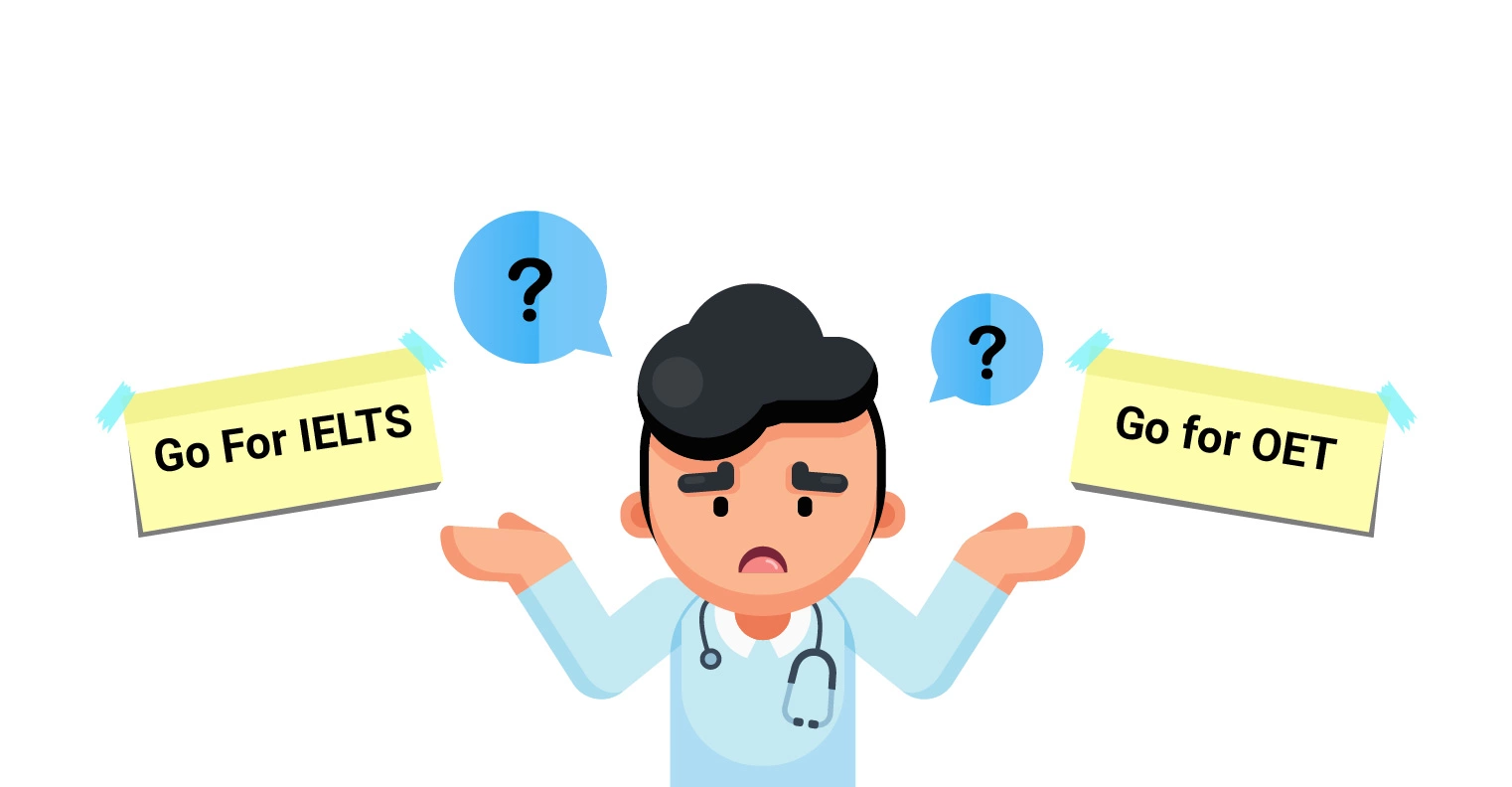 Vandana Kirat
Oct 30, 2025
Vandana Kirat
Oct 30, 2025

Are you unsure whether to take up OET or IELTS to study in foreign universities? Are you confused about the difference between the two exams? Let’s have that cleared.
To begin with, IELTS (International English Language Testing System) and OET(Occupational English Test) are both tests that assess your English language proficiency, but OET is specifically designed for healthcare professionals around the world. Both exams are accepted by the medical regulatory bodies of various countries to make sure that healthcare professionals have sufficient language skills to communicate with patients and colleagues and to perform adequate medical care.
The NMC (Nursing and Midwifery Council) and the GMC (General Medical Council) accept OET and IELTS. When OET tests your ability to communicate in English in a healthcare facility, IELTS tests your overall communicative English language skills. Let’s dive deeper to identify the differences and similarities between IELTS and OET and help you decide to choose the best.
Being a healthcare worker, both IELTS and OET are accepted in your field but IELTS focuses on more General based English. It is not tailored to medical professionals, and they would base the theme on general knowledge, hobbies, interests, or a variety of subjects that may encounter your day-to-day business in an English-speaking country.
OET is specifically designed for those who desire to take up the medical profession in an English-speaking country. Healthcare professionals prefer OET as it offers 12 versions of occupational tests for different healthcare workers in various fields including nurses, doctors, dentists, pharmacists, optometrists, podiatrists, occupational therapists, vets, speech pathologists, dieticians, physiotherapists, and radiographers.
Learn more about OET Introduction: A Brief Idea About OET Exams
Both the exams contain four subsets: reading, listening, writing, and speaking, but the content of the exam is not the same. IELTS provides academic English tests covering a wide variety of topics applicable to generic purposes. Whereas OET focuses on the medical-related context in their exams. This includes your ability to understand patients, conduct medical consultations and write discharge and referral letters.
The IELTS grades on a band scale of 0 - 9 and the OET grades from A to E. the GMC requires doctors to score a minimum of a B grade in OET with a B in each separate section or a minimum of a 7.5 in IELTS with a 7 in each sub-sets.
Despite the differences, both the exams are set to test your level of English proficiency, but the difficulty level differs depending on your strengths and weakness. As OET focuses on real-life medical situations, an ordinary person will find it difficult to pass the tests. Even though IELTS presents with general English, if you are not well-versed with communicative English, you may find it difficult. In the end, both the exams test your English level and if that is not up to the mark, you may find it difficult.
One of the most frustrating things about IELTS is retaking the whole exam when the candidate has failed to reach the minimum score in just one section out of the four. With the OET, you can bank the scores of the sections passed and would require retaking only the section in which the candidate had failed. For example, if you have below B grade in just writing, you can retake just the writing section, unlike IELTS.
But in some events, there are a few boards and institutions that require you to pass all the sections of the test in one sitting, so double-check with your institutions before concluding.
Check Out: IELTS Preparation Tips
When you are applying for work, related to the medical field, always confirm with the board or institution what kind of test score they accept there. Healthcare regulatory bodies accept OET in the UK, Ireland, Australia, New Zealand, Singapore, Dubai, Ukraine, and Namibia. Meanwhile, IELTS is viewed as the ‘gold standard’ and recognized by universities, healthcare regulatory bodies, immigration authorities, and companies across the world. It may be a better choice to proceed through if you are unsure of what field of work or study you may decide.
For More Details, OET Accepted Countries and Grades For Nurses and Doctors
Since both the exams are English proficiency tests, they both require excellent skill in the language, however, they both differ in their context. Hence, preparation for each test will be different and difficult. So, even before planning to prepare, one must fix which exam to take because it requires a heap load of effort and time into its preparation. If you have already invested an enormous amount of time into one, it is advisable not to switch between them both.
Since IELTS is widely accepted but over 3 million students appear for it, there are broad resources available because of its generalized nature of the test. OET comparatively has fewer candidates to take the exams, so the resources are less but focused on the prerequisites of the tests.
Considering IELTS is widely accepted and millions of candidates take the test, it costs about three times less than OET. OET is more targeted and focused towards a particular field of profession, resulting in fewer candidates than IELTS, hence it is expensive. There are more IELTS test dates available compared to OET because of its imprecise nature. Check the different OET test modes .
There may be a time in the journey of preparing for the test or after appearing for it you may feel frustrated and think about switching to the other option, thinking the other one would be easier. If you are in your early stages of preparations, this option may seem alright, but if you are deep into it, it may not be a good idea. Switching from IELTS to OET or vice versa, thinking it may help you pass, is absurd because ultimately it is an English test so maybe your skill in the English language needs more work. Doing a different test will not solve that problem.
Many medical professionals opt for OET over IELTS as it is more specific to their field. However, there are plenty of factors like the questions stated above, to be considered before choosing the exam. At the end of the day, either of the tests is designed to assess your English language proficiency. Therefore, you must evaluate your options and choose wisely based on your and the institution’s requirements. You can complete your higher secondary education with NIOS Classes.

Vandana is a highly qualified IELTS (British Council trained), and TESOL holder, with over 15 years of experience. She is a proactive professional with a progressive approach to teaching and lesson planning. She has the sound ability to maintain curriculum development. She is a science graduate, Six Sigma and PMP trained individual who has also worked with multinational companies in the Training & Quality domain for more than a decade. Right now, Vandana is working as an IELTS Trainer with Edoxi Training Institute, Dubai.